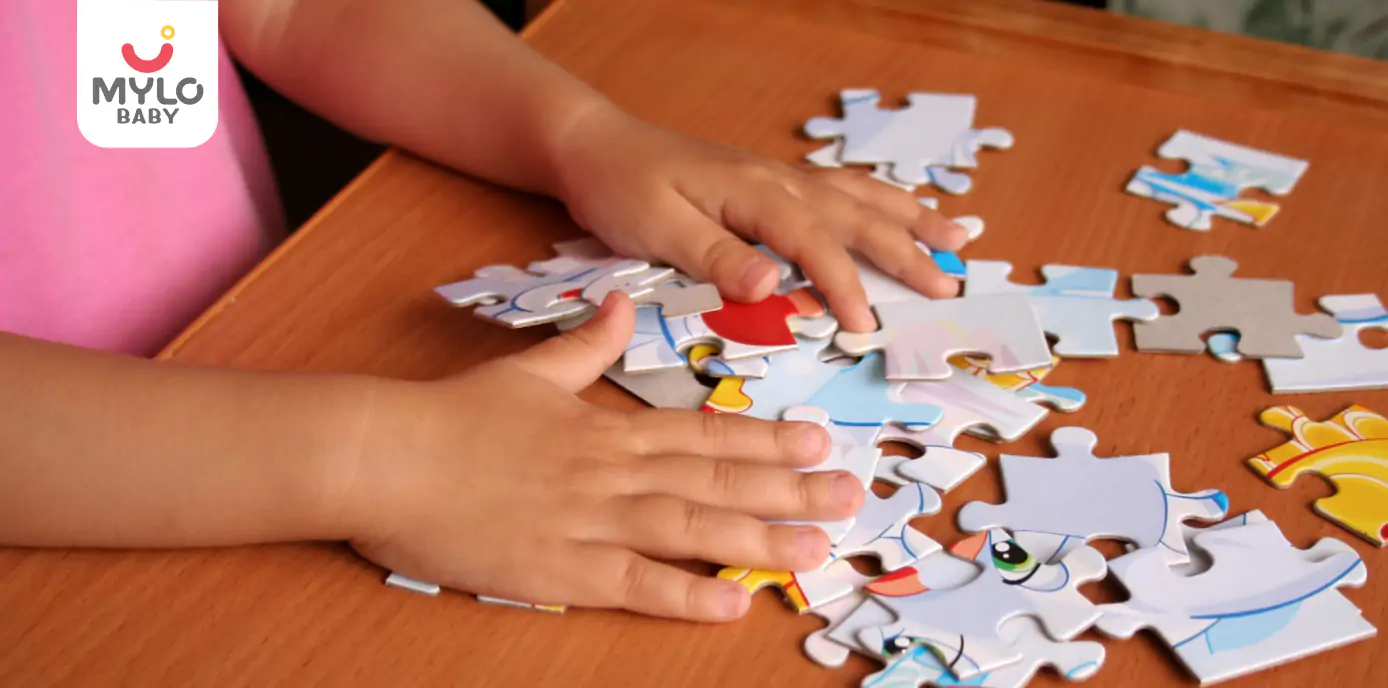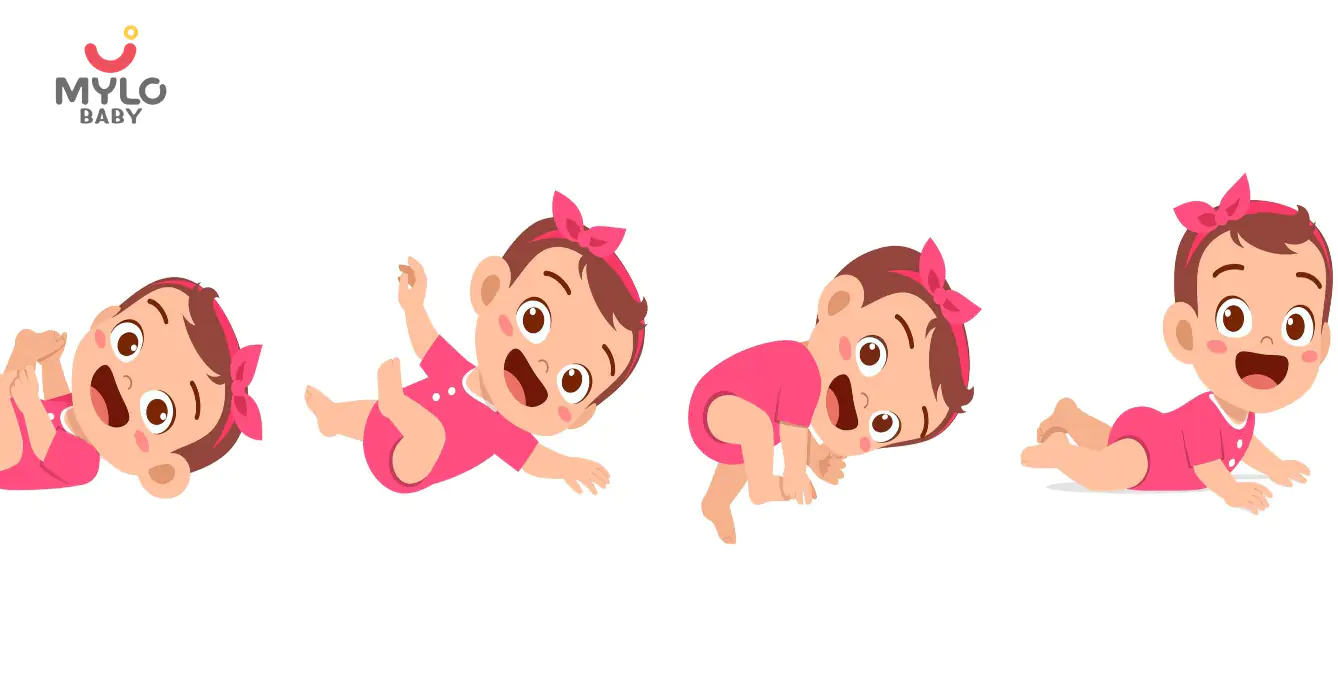Get MYLO APP
Install Mylo app Now and unlock new features
💰 Extra 20% OFF on 1st purchase
🥗 Get Diet Chart for your little one
📈 Track your baby’s growth
👩⚕️ Get daily tips

OR


Article Continues below advertisement
- Home

- Growth & Development

- The Development of Your Kid at the Age of Four Months
In this Article
- Baby Food for a 4-Month-Old
- Incorporating solid foods
- Tips for the Fourth Month of Your Baby's Life
- Final Words
- References
Growth & Development
 92465
92465The Development of Your Kid at the Age of Four Months
Updated on 21 February 2024
Your baby's development four months after birth will continue to be supported by breast milk or formula, which is still crucial. Expect to feed your baby five to six times a day on average if you're breastfeeding. A 24-36 ounce breast milk supply per day is reasonable.
Consult a doctor before starting foods with your child at the baby's four-month development milestone. After age 5 or 6, many doctors suggest that most infants begin eating solid foods.
You should remember that your infant only needs a spoonful of food once or twice a day if you start spooning up solids now. There will also be no need to eat the solids.
Article continues below advertisment
To maintain good body weight and height for the newborn, all that food will benefit. There are five feedings per day for formula-fed babies, and each bottle contains around 6 to 8 ounces of formula. This equates to 24 to 36 ounces of formula each day. It should fall between 10 and 19 pounds and 22 to 26.5 inches.
Your baby's doctor should not be alarmed if they fall outside this typical range, and you should not worry either. Just as every infant is unique, so is a baby's four-month development pattern.
Baby Food for a 4-Month-Old
Most infants are still breastfed, bottle-fed, or a mix of the two by the time they reach the age of four months. Every three or four hours, they'll consume a 4 to 6 ounces meal. Keep checking their diapers to make sure they're receiving enough nourishment. They need to have five to six wet diapers a day at the very least. If you see your infant making clicking noises while sucking, struggling to breathe, vomiting, or spitting up often, you should contact your physician.
Expect a dramatic shift in how often your baby wants to breastfeed as they become better at sleeping through the night and taking regular naps as a part of normal baby development for four months. Your baby may desire to breastfeed more often during development or illness.
Incorporating solid foods
Doctors recommend starting solids between the ages of 4 and 6 months, even if your baby requires breastmilk or formula at this point for four months of the baby's development. You should, however, always get the approval of your child's doctor before beginning any new activity. Dr. Garbi recommends that you only feed them soft things that they can smash with their gums after being given the all-clear. Watch for any allergic responses as you introduce them one by one.
Article continues below advertisment
Parents are encouraged by many physicians to follow their own child's signals when it comes to introducing solids, which is known as baby-led feeding. Solids shouldn't be taught too early since every infant is different. Some newborns may eat solid meals as early as four months, while others may not be able to until they are six months of age.
Tips for the Fourth Month of Your Baby's Life
Explore different textures with books such as Pat the Bunny or other touch-and-feel board books for your baby to play with for baby brain development at four months.
You should read or sing to your infant at least once a day. You don't need to be able to sing to make them happy; they'll be satisfied just being in your hands and hearing your voice.
Start thinking about childproofing now, even if your kid hasn't crawled or rolled over yet, as a part of 4 months of baby's physical development. Lock up cupboards, install stairway gates, and keep any cleaning supplies and other potentially hazardous items up and out of reach of curious babies.
Final Words
Your 4-month-old baby has been more awake and aware in the last few days. Babies love to grin, laugh, gurgle, and coo while they're this little.
Article continues below advertisment
Your child is eager to have fun, play games, and converse with you and anybody else who happens to pass by.
As a result, you can expect a lot of hilarity from him as he attempts his new identity.
References
- National Library of Medicine. (1836) : ''Age-appropriate diet for children.''
- Curtis, GB, (MD, MPH), and Schuler J. (2005). Your Baby’s First Year Week by Week, Da Capo Press



Written by
Shaveta Gupta
An expert in content marketing, Shaveta is an alumnus of IIT, Bombay, she knows what the audience is looking for. Mother of a 6 year old, she has been instrumental in planning the content strategy at Mylo.
Read MoreGet baby's diet chart, and growth tips

Related Articles
RECENTLY PUBLISHED ARTICLES
our most recent articles

Burping Your Baby
Burping Your Baby
(9,003 Views)

Crawling
What Is the Significance of Motor Skills in Children & How to Develop Them?
(93,634 Views)

Formula Feeding
The Ultimate Guide to Formula Milk: Everything You Need to Know
(29,213 Views)

Are baby monitors safe or dangerous for your little ones? How to protect your baby from EMF Radiations?
(25,042 Views)

Motor Skills
Here’s a List of a Lot of Things That You Need to Know When Your Baby Starts Rolling Over
(77,258 Views)

Travel & Holidays
How to Travel Around the World Stress-Free With Your Baby?
(3,264 Views)
- গর্ভবতী হওয়ার জন্য প্রধান 10টি যৌন অবস্থান: গর্ভধারণের চেষ্টাকারী দম্পতিদের জন্য আলোচনা | Top 10 Sex Positions to Get Pregnant: The Ultimate Guide for Couples Trying to Conceive in Bengali
- Welcoming New Born Baby Quotes to Celebrate Life's Greatest Gift
- It's a Baby Girl! 50+ Ideas for Announcing Your Daughter's Birth
- Never Miss These Crucial Warning Signs of Emotional Development Problems in Your Baby
- The Ultimate Guide to Using Almond Oil for Baby Massage
- An ultimate guide about health, growth, and care for a 7-weeks-old baby
- Posterior Placenta: A Comprehensive Guide for Moms-to-Be
- Let's know more about the growth and development of the brain in infants and early childhood.
- Postnatal Care in India
- Low Birth Weight: Causes, Complications & Treatment
- Laparoscopic Ovarian Drilling: A Safe and Effective Solution for PCOS-Related Infertility
- Headache During Pregnancy: The Ultimate Guide to Causes and Cures
- Fetal Doppler Scan During Pregnancy: In which week should you get it done?
- How Long Should Naps Be While Pregnant?


AWARDS AND RECOGNITION
Mylo wins Forbes D2C Disruptor award
Mylo wins The Economic Times Promising Brands 2022
AS SEEN IN
















At Mylo, we help young parents raise happy and healthy families with our innovative new-age solutions:
- Mylo Care: Effective and science-backed personal care and wellness solutions for a joyful you.
- Mylo Baby: Science-backed, gentle and effective personal care & hygiene range for your little one.
- Mylo Community: Trusted and empathetic community of 10mn+ parents and experts.
Product Categories
baby carrier | baby soap | baby wipes | stretch marks cream | baby cream | baby shampoo | baby massage oil | baby hair oil | stretch marks oil | baby body wash | baby powder | baby lotion | diaper rash cream | newborn diapers | teether | baby kajal | baby diapers | cloth diapers |








